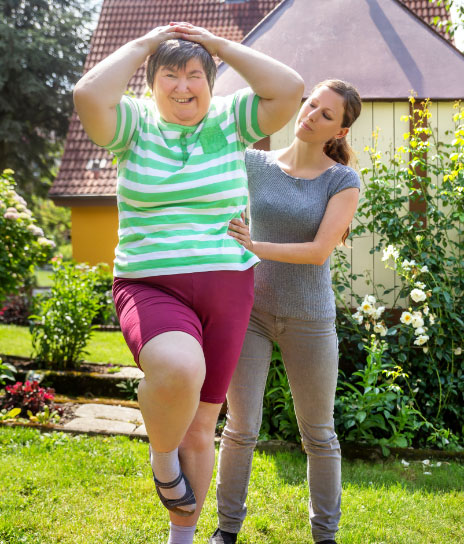Intellectual Disability Support Services | Exercise Physiology, Dietetics, Physiotherapy
Mobile Allied Health Services for People with Intellectual Disability
Active Ability provides mobile allied health therapies to assist with managing the health conditions associated with intellectual disability for people throughout Sydney, Wollongong and the Sunshine Coast.
Our professional, caring team support a range of clients with intellectual disability.
We have extensive experience working with individuals living with
- Down syndrome
- Autism spectrum disorder (ASD)
- Developmental delay
- Prader-Willi syndrome
- Williams syndrome
- Bardet-Biedl syndrome
- Foetal alcohol spectrum syndrome
- Angelman’s syndrome
- Chromosomal disorders
- Fragile X syndrome
Intellectual disability is a broad term used to describe difficulties in learning and communication which can significantly impact the daily life of the individual and their family. The impact of intellectual disability on a person’s independence and functional capacity can range from mild to severe or profound.
Achieving excellent health and wellbeing may seem daunting to individuals with intellectual disability and/or their carers, and it can be difficult to know where to start!
Active Ability’s skilled, expert allied health team provide high quality intellectual disability services and support. We can help by assessing your needs and goals and providing recommendations to get you started.
Our mobile service is ideal for individuals with an intellectual disability who feel more comfortable in a familiar setting such as their own home. It also allows health recommendations to be put into place where they are most helpful and meaningful.
Give us a call on (02) 8678 7874, check out our client stories or fill our NDIS referral form below to arrange services.
hidden
Important health information for people with Intellectual Disability
In February 2020, the NDIS Quality and Safeguards Commission published a report exploring why people with intellectual disability die 20-36 years earlier, on average, than individuals without an intellectual disability.
They found that respiratory diseases were the most common underlying cause of early death, followed by diseases of the nervous and circulatory systems.
Many of these diseases can be prevented, or successfully identified and managed, with appropriate support from allied health professionals.
Therefore, it is incredibly important to consider the positive impact that dietetic, exercise physiology and physiotherapy support can have on quality of life in managing disability-related health concerns and reducing risk of further morbidity (and disability) and early mortality.
Our Intellectual Disability Support Services

Exercise for Intellectual Disability Management
Exercise programs for individuals with intellectual disabilities play a vital role in maintaining a healthy lifestyle and prevention of many chronic diseases. Active Ability’s experienced, qualified exercise physiologists provide a range of services, including land-based exercise and aquatic or hydrotherapy programs.
For management of intellectual disability, exercise interventions can support you in various ways, including:
- Management of physical health, including blood pressure, cholesterol and blood sugar levels
- Increasing strength, which can improve functional capacity
- Improved mood in the context of clinical depression and anxiety
- Improved confidence with exercise
- Improved gross motor function for children with intellectual disability and autism
- Support for weight management
- Support for behaviour management
- Improved quality and/or quantity of sleep
- Improved mobility
- Improved balance and coordination
Regular, targeted physical activity programs can lead to noticeable improvements in strength, balance, gait, and overall health and wellbeing. It can also provide a fun way for people with an intellectual disability to interact socially and get more involved in their community.
Our talented exercise physiologists can provide engaging, individualised exercise programs to help you reach your goals. We have experience supporting people in both group home and private settings. We can also provide education, staff-training, advice and recommendations surrounding physical activity.
Hornsby Hydro Group Program
Where: Hornsby Aquatic & Leisure Centre, Hornsby
When: Mondays at 5:30pm, during school term (4 x 10wk program)
What: Pool based physical activity focusing on aerobic activity and muscle strength through games and activities – we have a lot of fun!
Who: adults aged 16 – 40 years with an intellectual disability.
Call us today on (02) 8678 7874 to get more info on this program!

Nutrition and Intellectual Disability
Good nutrition plays a key role in any healthy lifestyle by improving energy levels, boosting health status and decreasing the risk for developing many chronic diseases. Our team of skilled dietitians are dedicated to supporting people with an intellectual disability achieve better health and quality of life through improved nutrition.
People with an intellectual disability might require additional support in optimising their nutrition. Common areas where people with an intellectual disability may benefit from dietetic support include:
- Weight management
- Improving variety of diet
- Establishing ordered eating patterns
- Encouraging participation in food preparation and cooking
- Nutritional management of gastrointestinal symptoms and constipation
- Improving nutrition-related knowledge to promote independence in choosing healthy options
Our dietitians are trained in motivational interviewing, adopt a client-centred approach and aim to educate and empower people with intellectual disabilities and their support people with tools to kickstart a healthy diet and make healthy choices.
Dietitians can assist through providing client-centred education, dietary assessment, individualised goal setting for diet optimisation, staff training, menu planning and recipe development.
Active Ability’s dietitians also have experience in providing services to people with intellectual disabilities in both private and group home settings.

Physiotherapy and Management of Intellectual Disability
Many conditions that cause intellectual disability also affect the individual’s physical function. Physiotherapists are qualified to assess and manage body structure and movement disorders, such as those involving mobility, balance, coordination and posture.
Physiotherapy management for people with intellectual disability may include:
- managing musculoskeletal, neurological and respiratory issues associated with the condition
- improving or maintaining functional movement and independence
- preventing or managing contractures and fixed positional deformities
- gross and fine motor skill development
- training carers and/or support people
- management of pain and/or stiffness
Active Ability’s qualified physios will review your medical history, assess your function and talk to you (and your support people) about your needs and goals. They will devise a treatment plan to help you achieve those goals, making sure they are realistic and achievable.
Physios may also be involved in educating and training carers in movement strategies such as supporting you to mobilise and transfer safely at home or in the community.
hidden
How to get started with intellectual disability services with Active Ability
For more information about arranging a service agreement with Active Ability, contact us via our online enquiry form or call us on (02) 8678 7874 (Monday to Friday). One of our caring team members will gladly answer your questions.
If you’d like to get started straight away, please fill out our NDIS referral form below.